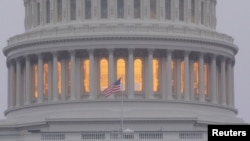
Efforts by U.S. adversaries to divide Americans and sow growing distrust in the upcoming presidential election have already begun to intensify, according to senior U.S. intelligence officials, who warn some countries appear to be leaning toward additional measures to spark election-related violence.
The latest declassified assessment, issued Tuesday by the Office of the Director of National Intelligence, comes just two weeks before voters head to the polls November 5 to choose a new president and vote on a series of statewide and local races and initiatives.
“Foreign actors — particularly Russia, Iran and China — remain intent on fanning divisive narratives to divide Americans and undermine Americans’ confidence in the U.S. democratic system consistent with what they perceive to be in their interests,” according to the assessment.
But it warns U.S. intelligence agencies are “increasingly confident” that Russia is starting to engage in plans “aimed at inciting violence.”
It further assesses Iran also “may try to incite violence.”
Post-poll closing concerns
Of particular concern is what appears to be a growing focus on the hours, days and weeks after the polls close, when state and local election officials begin to tally and certify the results.
U.S. adversaries "probably will be quick to create false narratives or amplify content they think will create confusion about the election, such as posting claims of election irregularities," said a U.S. intelligence official, briefing reporters on the condition of anonymity to discuss the assessment in additional detail.
The official said Russia, Iran and China “may perceive a window of vulnerability to push disinformation or foment or amplify protests and threats” starting with the moment polling centers close and extending to January 6, when the presidential results are certified by a joint session of Congress.
"Foreign driven or amplified violent protests, violence or physical threats to election workers or state and local officials could challenge state and local officials' ability to conduct elements of the certification and Electoral College process,” the official said. “Particularly if they prevent necessary physical access to facilities or venues."
U.S. intelligence officials have previously warned that Russia and Iran have been especially active, running a variety of influence operations targeting U.S. voters, with a high likelihood that these efforts would extend beyond the November 5 election.
Russia, they said, has been working to boost the chances of former president and current Republican nominee Donald Trump, while Iran has been working to hurt Trump’s reelection bid and instead buoy the campaign of Vice President Kamala Harris, the Democratic presidential nominee.
China, according to U.S. intelligence officials, has so far stayed out of the presidential race, focusing its efforts on congressional and state and local candidates perceived to be promoting policies detrimental to Beijing's interests, including those voicing support for Taiwan.
Officials said Tuesday that new intelligence streams have raised concerns that Moscow, especially, will try to foment violence once the polls close.
"We expect Russia will be more aggressive in this period if the vice president [Kamala Harris] wins the election," the intelligence official said. “Russia would prefer the former president to win, and they would seek to more aggressively undermine the presidency of the then-president-elect.”
Russia, China and Iran have all rejected previous U.S. accusations of election meddling.
Russia and Iran have yet to respond to requests from VOA for comment, but China on Tuesday again rejected the latest U.S. intelligence findings.
“The presidential elections are the United States’ own affairs,” Liu Pengyu, the spokesperson for the Chinese Embassy in Washington, told VOA in an email. “China has no intention and will not interfere.”
U.S. intelligence officials, though, point to what they describe as growing examples of malign intent, especially by Russia and Iran.
Influence operations
In one example, the officials said Russian-linked actors were responsible for a post on the X social media platform earlier this month that contained false allegations against Democratic vice presidential candidate Tim Walz.
“There are several indicators of manipulation that are consistent with the influence, efforts and tactics of Russian influence actors this cycle,” the U.S. intelligence official said.
In another case, U.S. officials said a Russian intelligence unit sought to recruit what they assess to likely be an unwitting American to organize protests.
They also point to actions taken last month by multiple U.S. agencies to counter several Russian influence efforts, including the use of fake websites and the creation of a shell company to funnel $10 million to a U.S. media company to push pro-Russian propaganda.
Also last month, the U.S. placed bounties and lodged criminal charges against three Iranian hackers, all accused of seeking to undermine the Trump reelection campaign.
And there are fears that even these types of ongoing influence operations, which often seek to exploit divisive political issues, could lead to problems.
"Even if these disinformation campaigns are not specifically calling for violence, the tactics used to undermine confidence in the democratic institutions can lead to violence, even if not deliberately called for," said a senior official with the U.S. Cybersecurity and Infrastructure Security Agency, or CISA, who, like the U.S. intelligence official, spoke on the condition of anonymity.
‘Expect disruptions’
And while U.S. officials express confidence that safeguards are in place to prevent U.S. adversaries from attacking or hacking systems used to record and tally votes, there is concern that they will target other U.S. infrastructure to try to induce panic or violence.
“That is a real possibility," said the CISA official, adding the U.S. public should “expect disruptions.”
“We're going to see a voting location lose power,” the official said. “We're going to see potentially some type of impact on a transportation system. We're going to see a potential ransomware attack against a local election office.”
CISA officials say they have been working with state and local election officials to make sure they are prepared to handle sudden disruptions. And state officials say they are prepared.
“All states consider their election infrastructure and IT [information technology] systems a potential target for threats,” said Steve Simon, Minnesota’s secretary of state and the president of the National Association of Secretaries of State, during a call with reporters Monday.
“Chief elections officials throughout the United States have worked really tirelessly and consistently to mitigate risks to our election systems and processes,” said Simon.











